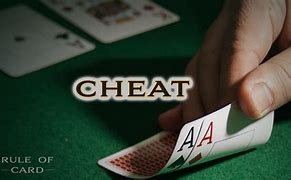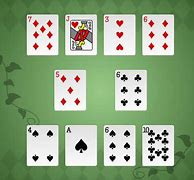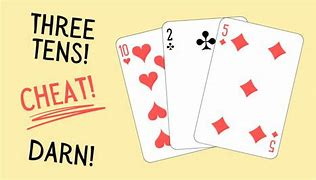Content Menu
● Introduction to Cheat
>> Objective of the Game
● Setting Up the Game
● Basic Rules of Cheat
>> Gameplay Mechanics
>> End of Round
● Strategies for Success in Cheat
● Variations of Cheat
● Conclusion
● Frequently Asked Questions
>> 1. What materials do I need to play Cheat?
>> 2. How many players can participate in Cheat?
>> 3. Can I really cheat in this game?
>> 4. What happens if I call someone out incorrectly?
>> 5. Are there any strategies for winning at Cheat?
Cheat, also known by various names such as Bullsh*t or I Doubt It, is a lively and engaging card game that thrives on deception, bluffing, and strategy. This game is perfect for gatherings, as it encourages interaction and often leads to humorous situations. In this article, we will explore the rules, strategies, variations, and tips on how to play Cheat effectively.

Introduction to Cheat
Cheat is primarily a game of getting rid of all your cards before your opponents do. The twist lies in the fact that players can lie about the cards they are playing. This element of deceit makes the game exciting and unpredictable. The game can be played with a standard deck of 52 cards and accommodates anywhere from 2 to 10 players, though larger groups might benefit from using two decks.
Objective of the Game
The main objective of Cheat is straightforward: be the first player to discard all your cards. However, players must navigate the challenge of lying about their cards while avoiding being caught by their opponents.
Setting Up the Game
To begin playing Cheat, follow these simple steps:
1. Gather Players: Assemble a group of at least two players; more players make the game more fun.
2. Deal Cards: Shuffle a standard deck of cards and deal them out evenly among all players. Some players may end up with more cards than others, which is acceptable.
3. Determine Starting Player: Choose a player to start the game. This can be done randomly or by any method the group agrees upon.
Basic Rules of Cheat
The rules of Cheat are easy to learn but allow for strategic depth as players become more familiar with the game dynamics.
Gameplay Mechanics
1. Starting Play: The first player must discard one or more cards face down onto a central pile while declaring their rank (e.g., "two sevens"). The rank must be one that follows the last rank played; if it's the first turn, they typically start with Aces.
2. Continuing Play: The next player must then play cards of either the next rank up or down from the previous player's declaration. For instance, if the last player claimed to play "two sevens," the next player could play either "two eights" or "two sixes."
3. Lying About Cards: Players are allowed to lie about the cards they are playing. For example, if a player has no sevens but wants to discard cards anyway, they can claim to play sevens while actually putting down different cards.
4. Calling 'Cheat': If any player suspects that another player is lying about their card(s), they can challenge them by calling out “Cheat!” The challenged player must then reveal their discarded cards:
- If they were lying, they must pick up the entire discard pile.
- If they were truthful, the challenger must take the pile instead.
5. Winning the Game: The first player to successfully discard all their cards wins. However, if they play their last card(s) and are challenged successfully, they must pick up the pile and continue playing.
End of Round
Play continues until one player runs out of cards. If multiple players remain with cards after another round concludes, gameplay continues until only one player has cards left.

Strategies for Success in Cheat
While Cheat involves a significant amount of luck, employing some strategic thinking can increase your chances of winning:
- Observe Opponents: Pay attention to patterns in how other players discard their cards and whether they tend to bluff often.
- Bluff Effectively: When you do decide to lie, ensure you're convincing. Mix in truthful plays with bluffs to keep opponents guessing.
- Know When to Challenge: Be cautious when calling someone out for cheating; if you're wrong, you'll be penalized by picking up all discarded cards.
- Manage Your Hand: Keep track of which ranks have been played and adjust your strategy accordingly based on what you have left in your hand.
- Use Psychological Tactics: Sometimes pretending to be more nervous or confident can influence how others perceive your honesty during play.
Variations of Cheat
To keep things fresh and exciting, there are numerous variations of Cheat that you can try:
- Unlimited Values: Players can play any value card instead of being restricted to ranks above or below.
- Fixed Direction Play: Players may only play ranks in one direction—either strictly ascending or descending.
- Cheating on Card Count: Players may lie about how many cards they are playing (e.g., claiming three but actually playing four).
- Inclusion of Jokers: Jokers can be introduced as wild cards that represent any rank but cannot be declared as such during play.
- Drinking Game Version: In this variation, players take drinks when caught cheating or when incorrectly challenging another player's honesty.
Conclusion
Cheat is a delightful card game that combines strategy with deception, making it an excellent choice for social gatherings or family game nights. With its simple rules and engaging gameplay mechanics, it caters to both casual players and those who enjoy competitive play. By mastering the art of bluffing and learning when to challenge others effectively, you can enhance your chances of winning while ensuring everyone has fun.

Frequently Asked Questions
1. What materials do I need to play Cheat?
You only need a standard deck of 52 playing cards and at least two players (ideally more for better gameplay).
2. How many players can participate in Cheat?
Cheat can accommodate between 2 to 10 players comfortably; however, using two decks allows for larger groups.
3. Can I really cheat in this game?
Yes! Cheating is part of the game's mechanics; however, you risk being caught if other players challenge your claims.
4. What happens if I call someone out incorrectly?
If you call “Cheat” on someone who was telling the truth about their discard, you must pick up all the cards in the discard pile.
5. Are there any strategies for winning at Cheat?
Observing opponents' patterns, bluffing effectively, managing your hand wisely, knowing when to challenge others, and employing psychological tactics can all improve your chances of winning.
































